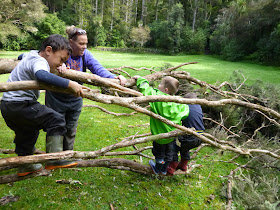In Whangarei we have been experiencing typical spring
weather, a little bit sunny, a little bit rainy and a lots of blustery gales. It is the weather that makes our nature
programme as we get to experience nature through different conditions year
round, such as, squishy and muddy in winter to dry and hard in summer.
Last month when on our usual nature programme excursion we made a surprise discovery in an area that our children aptly name ‘The
Meadow’, there was an enormous ti tree that had fallen and was lying on the
grass. We ran over for a closer
inspection and it seemed even bigger, we all stood there staring at the tree,
then wondered... what happen to the tree?
How did it fall down? When did it
happen?
“In every walk with nature one receives far more than he
seeks”.
John Muir
This initiated a group discussion about what may have
happened to the tree. It was wonderful
how our children seemed to put such effort into thinking about the tree and
developed some great ideas that they were willing to share with the group,
including;
Dre: Someone cut it down
Ryker: Thunder broke it down Carter: Thunder smashed it down
Dre: I think the wind broke it down
Ryker: It was a big giant that pushed it down
Carter: Maybe someone swinged on it
Lucas: I think a life cut it down
Dre: I think a tiger cut it down
Nika: I think the wind blew it down
Mayson: It split
Isla: I think someone cut it down or a hammer
Archie: A chainsaw
Mayson: Someone pushed it over
Archie: I think a giant pushed it over
I loved hearing all the children’s theories about what may
have happened to the tree, it certainly was an interesting start to our nature
programme. When we had a closer look at
the tree and its split trunk, we were still wondering how it ended up on the
grass, however there was the added bonus of it becoming the best adventure
playground that nature has to offer! So
we began our explorations of the tree, by climbing, balancing, hanging,
crawling, bouncing, jumping, walking and sitting on it.
Carter had a great idea of getting the saw and other real
tools that we carry on the nature programme out of our gear bags. This was a brilliant idea as the tree
provided many sawing options as there were lots of different branches to choose
from - thin to thick. The children were
awesome with taking turns and sharing the saw with each other and offering
encouragement to keep sawing when needed.
We spent a considerable amount of time, in fact most of our morning
discovering new ways to explore the tree.
The weeks after the initial discovery, our nature programme
children were keen to keep revisiting the tree and would spend the majority of
the morning exploring it and all the challenges that it may bring, finding
different ways to incorporate it into their play and seemingly enjoying all it
has to offer. I loved how some of the
children would report back to me that the ti tree, that had provided so much joy, was still there.
Last week when it was my turn to lead the nature programme (also it was the first time for the new term) we arrived at ‘The Meadow’ our excitement quickly faded for a little while as we realised that the tree had now completely gone. We will miss the fallen ti tree and all the wonderful learning opportunities and experiences it offered. That’s the beauty of the nature programme no two weeks are the same.
Last week when it was my turn to lead the nature programme (also it was the first time for the new term) we arrived at ‘The Meadow’ our excitement quickly faded for a little while as we realised that the tree had now completely gone. We will miss the fallen ti tree and all the wonderful learning opportunities and experiences it offered. That’s the beauty of the nature programme no two weeks are the same.
The natural world is a playground and place of discovery for adults and
children alike, it is a place for adventure, exploration and imagination as
well as generating a deepening care and connectedness with our environment.
(Department of Conservation, 2011)
I am passionate about our nature programme and feel privileged
to be part of it. It is even more
special when we get a wonderful surprise, like the fallen ti tree. It wasn’t
only the children who enjoyed the tree, I also loved climbing on it. It brought back all my own special childhood
memories of climbing trees. There are just
so many benefits for our children, when they connect with nature. The Department of Conservation states that many studies show the positive links between
direct experiences in nature and children’s mental, emotional, and physical
health and well-being. The studies show
that regular direct access to nature can; increase self esteem and resilience
against stress and adversity. Improve
concentration, learning, creativity, cognitive development, cooperation,
flexibility and self-awareness. (Department of Conservation, 2011).
Mā te wā
Susie
















No comments:
Post a Comment